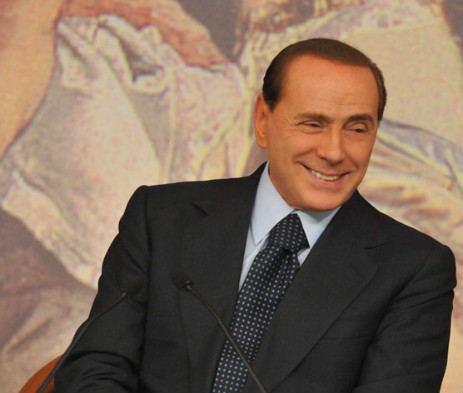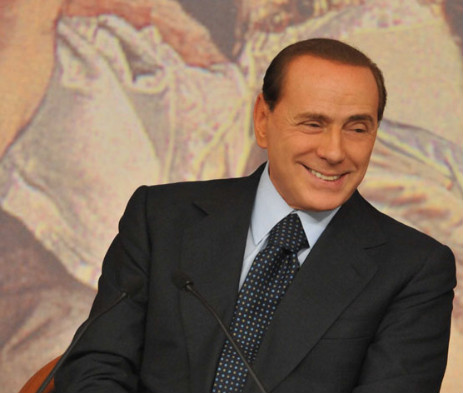
G8 officials don’t want Silvio Berlusconi to play a leading role in any climate talks that may occur this summer during the July summit in Italy. (Photo Livio Anticoli, Courtesy Prime Minister of Italy’s Office)
Barack Obama has a problem, one he shares with Gordon Brown. And, for that matter, with Nicolas Sarkozy, Angela Merkel, Stephen Harper, and even Lula da Silva.
The problem these A-list world leaders are dealing with is bald, perma-tanned, and once worked as a cruise ship crooner. Oh yes, and he just happens to be prime minister of Italy, one of the most colorful (and that’s not just his tan) and controversial figures ever to have lead a major western country.
A media tycoon and one of Italy’s richest men, Silvio Berlusconi has a knack for hitting the headlines, most recently for appointing Mara Carafagna — a former topless model who celebrates Sarah Palin as one of her political heroes — as his spokeswoman. And he has a talent, too, for giving rise to embarrassment.
Last summer, in an infamous incident, the red face belonged to George W. Bush, whose staff had to apologize for “an unfortunate mistake” after they issued a press kit for the G8 summit that described the Italian premier as “one of the most controversial leaders in the history of a country known for government corruption and vice.”
Berlusconi, it went on, “was hated by many, but respected by all at least for his personal style” and was “regarded by many as a political dilettante who gained his high office only through use of his considerable influence on the national media.” And all this just a month after Bush had warmly hailed Berlusconi as “a good friend.”
But to get to the point, the Italian leader poses a threat to President Obama’s latest attempt to galvanize the glacially slow international negotiations on a new climate treaty, which is the topic for an ongoing international gathering in Bonn. At Obama’s suggestion, the leaders of the world’s 16 most important economies – both developed and developing – are to hold a special summit designed to inject high level political will into the process.
The question was where and when they could meet soon enough to have an early enough impact on the talks leading up to the make-or-break negotiating session in Copenhagen this December. The obvious answer was to meet immediately before or after July’s G8 summit, when most of them would be together anyway, either as leaders of the eight major industrialized economies that meet each year or as the heads of the big developing countries that have recently been regularly invited to join them.
The venue of the meeting rotates each year around the G8 countries. This summer it is to be held on a rocky granite island renowned for its beaches — La Maddalena off of Sardinia. Which means, as you will have guessed, that the summit will be held in Italy and that Mr Berlusconi, as host, would normally chair it.
The trouble is that the irrepressible Italian leader seems to be far from keen on urgently combatting climate change. Five years ago, during an earlier spell as premier, he failed altogether to turn up to a meeting of European environment ministers in Milan to make a crucial speech backing the Kyoto Protocol. And since the outbreak of the financial crisis this autumn, he has led attempts to persuade the European Union countries to water down measures to tackle global warming. In December he told journalists that it was “absurd to speak of emissions when there is a crisis going on”, adding: “It’s like someone with pneumonia thinking about having a perm.”
He is, admittedly, not alone. Coal-dependent Poland’s premier, Donald Tusk, has joined Berlusconi in trying to obstruct European action (“We think that the simplistic ‘polluter pays’ principle is unacceptable,” he says.) And the Czech president, Vaclav Klaus, is an out and out global warming naysayer, telling a conference of 600 climate change ‘deniers’ in Washington last month that those advocating action want “to stop economic growth and return mankind several centuries back.”
But Berlusconi is a much bigger fish than either and so could step into the chief climate villain spot — a position only recently vacated by Bush. All this means that his fellow G8 leaders do not want him in charge for any climate negotiations that occur at La Maddalena this summer. “He will be the host of the meeting, but not the chair,” one well-placed source tells me. But they have yet to decide who will take his place.
The G8 countries need to sort it out soon. The meeting will be all the more important because the leaders attending the G20 meeting in London this week will do no more than issue warm words on the need for a climate deal in Copenhagen and to build a low carbon economy. They will instead address the struggling global economy and leave the real talking on climate to La Maddalena — but not, it is to be hoped, to Mr. Berlusconi.



